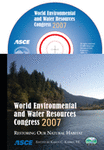Statistical Feature Selection for Hydrologic Prediction Models
Publication: World Environmental and Water Resources Congress 2007: Restoring Our Natural Habitat
Abstract
Hydrological processes at regional scales are known to be linked to global climate patterns. State-of-the-art statistical models utilize indicators of atmospheric and oceanic circulation for hydrologic prediction. Sea surface temperature (SST) that controls the exchange of heat and momentum between the ocean and the atmosphere is often used as a key input variable in these models. The accuracy of these models depends largely on the selection of location and timing of SST observations from several thousand possible combinations. Most of the studies to date have used linear correlation between global SST observations and hydrological variables as a measure for feature selection or have relied on principal component analysis for feature extraction. The availability of new and reliable SST data from remote sensing and other sources offers an opportunity to investigate the possibility of finding new features in global SST data that can be used in hydrologic prediction models. To this end, a two step approach to feature selection is proposed in this work. In the first step, probabilistic principal component analysis (PPCA) is used to extract features, and in the second step support vector machine-based recursive feature elimination algorithm (SVM-RFE) is used to select best features form the extracted principal components (PCs). The effectiveness of the proposed approach is illustrated through its application to Indian summer monsoon rainfall (ISMR) data. The results indicate that the proposed method can successfully obtain a small subset of SST patterns that can correctly classify extreme states in ISMR. Some of the identified patterns have resemblance with patterns that are well established in literature. Investigation on the relationship between selected SST patterns and ISMR indicate that they have a dynamical relationship. A static forecasting model, therefore, cannot achieve high forecasting skills. Instead a dynamic forecasting model is needed to fully exploit the potential of selected features in forecasting ISMR.
Get full access to this chapter
View all available purchase options and get full access to this chapter.
Information & Authors
Information
Published In
Copyright
© 2007 American Society of Civil Engineers.
History
Published online: Apr 26, 2012
Authors
Metrics & Citations
Metrics
Citations
Download citation
If you have the appropriate software installed, you can download article citation data to the citation manager of your choice. Simply select your manager software from the list below and click Download.
